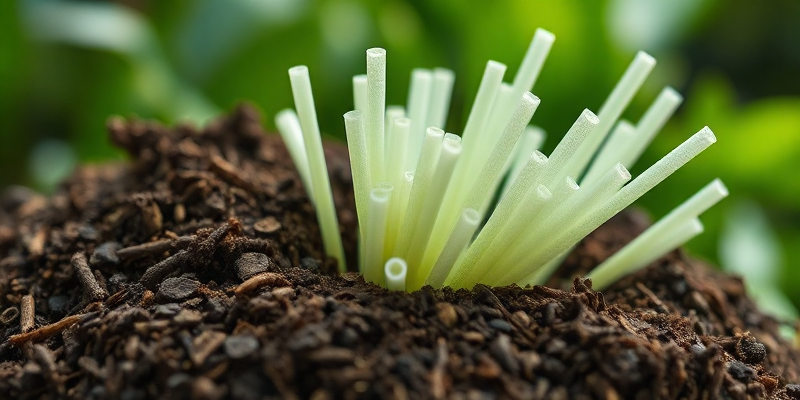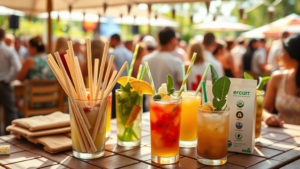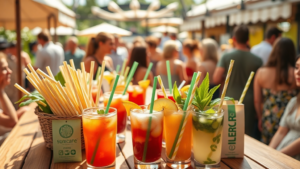Sustainable Compostable Straws for B2B: Certifications, Costs & Преимущества

Introduction: The Essential Shift to Sustainable Alternatives

Picture this: A hotel manager in Miami receives notice that their city has just passed a plastic straw ban, giving businesses only three months to comply or face hefty fines. Sound familiar? This scenario is playing out acros the globe as municipalities, states, and entire countries crack down on single-use plastics.
The urgency behind this shift is clear. According to the UNEP, over 500 million plastic straws are used daily in the United States alone—most ending up in our oceans and landfills where they’ll remain for up to 200 years. For businesses in the hospitality sector, from small cafes to hotel chains, finding sustainable alternatives isn’t just about compliance—it’s about staying ahead in a market increasingly defined by eco-consciousnes.
Compostable straws have emerged as the leading solution for forward-thinking businesses. Unlike their plastic counterparts, these straws break down naturally, returning to the earth without leaving harmful microplastics behind. But navigating the world of compostable straws comes with its own set of questions: Which certifications matter? How do costs compare? Will customers notice the difference?
Explore the essential guide to compostable straws embracing eco-friendly alternatives and their benefits for your busines to understand why businesses worldwide are making the switch. Whether you’re a café owner looking to reduce your ecological footprint, a hotel procurement manager seeking FDA-certified alternatives, or an event planning company calculating the ROI of sustainable practices, this comprehensive guide addresses the crucial aspects of transitioning to compostable straws in your busines operations.
Regulatory Compliance: Certifications That Matter for Compostable Straws

Understanding certifications isn’t just bureaucratic box-ticking—it’s essential protection for your busines and customers. In an industry flooded with “greenwashing,” legitimate certifications separate genuinely sustainable products from clever marketing.
FDA certification stands as the gold standard for any product that contacts food or beverages in the United States. The FDA ensures materials won’t leach harmful chemicals into drinks, making this certification non-negotiable for reputable businesses. Similarly, for operations in Europe and beyond, LFGB certification provides comparable assurance of product safety.
But safety certifications are just the beginning. For compostable products, two primary certifications matter:
1. **Industrial Compostability (BPI, EN13432, AS4736)**: Verifies the product will break down in commercial composting facilities within a specified timeframe.
2. **Home Compostability (TÜV AUSTRIA, OK Compost HOME)**: The gold standard, confirming products will compost even in home composting conditions.
The distinction matters significantly—research from the University of Plymouth found that 60% of products labeled “biodegradable” didn’t actually break down in home composting environments. Home compostable certification represents the highest standard, ensuring products degrade naturally in diverse conditions.
For B2B buyers, these certifications provide legal protection and marketing advantages. When Chicago implemented its plastic straw ban in 2020, businesses lacking proper documentation faced fines up to $500 per day. Learn how certified compostable straws can help your events stay compliant with local regulations while enhancing your sustainability credentials.
When sourcing compostable straws, always request certification documentation from suppliers. Legitimate manufacturers will readily provide these credentials, demonstrating transparency and commitment to quality.
How Compostable Straws Compare to Other Eco Alternatives

Not all sustainable straws are created equal. Let’s compare the leading contenders:
| Straw Type | Долговечность | Пользовательский опыт | Компостируемость | Average Cost (B2B) | Лучше всего для |
|---|---|---|---|---|---|
| ———— | ———— | —————– | —————- | ——————- | ———- |
| Бумажные трубочки | Low (1-2 hours) | Soggy when wet | Industrial | $0.01-0.03/unit | Quick-service venues |
| PLA “Corn” Straws | Medium (4+ hours) | Similar to plastic | Industrial only | $0.02-0.05/unit | Standard beverage service |
| Agave Straws | High (8+ hours) | Rigid, no taste | Home compostable | $0.04-0.07/unit | Premium establishments |
| Соломка из сахарного тростника | High (6+ hours) | Natural feel, slight texture | Home compostable | $0.03-0.06/unit | Versatile applications |
| Пшеничная соломка | Medium (3-4 hours) | Natural look and feel | Home compostable | $0.02-0.05/unit | Rustic aesthetics |
| Metal Straws | Indefinite | Cold sensation | Not compostable | $0.50-1.50/unit | Reusable programs |
The most significant market insight comes from a 2022 Nielsen study showing that 73% of consumers who experienced paper straws reported dissatisfaction, primarily due to their tendency to become soggy. This explains why many businesses that initially switched to paper alternatives are now exploring more durable compostable options.
Discover why agave straws have become a premium choice for businesses seeking durability and sustainability. Their robust performance in hot, cold, and even alcoholic beverages makes them particularly valuable for establishments where beverage quality and presentation are paramount.
While metal straws offer a reusable solution, they present logistical challenges in commercial settings, including sanitization requirements, theft concerns, and higher per-unit costs. For most B2B applications, home compostable plant-based straws offer the optimal balance of performance, sustainability, and operational practicality.
Top Busines Benefits of Switching to Compostable Straws
The busines case for compostable straws extends far beyond environmental virtue—it delivers tangible benefits to your bottom line.
### Enhanced Brand Perception
A 2023 McKinsey study revealed that 78% of consumers consider sustainability initiatives when choosing hospitality venues, with visible eco-friendly practices (like compostable straws) creating significantly stronger impressions than behind-the-scenes efforts. This translates directly to customer acquisition and retention.
### Regulatory Proofing
Forward-thinking businesses are future-proofing operations against the inevitable expansion of plastic bans. By transitioning before regulations force change, companies avoid rushed implementation, gain negotiating leverage with suppliers, and position themselves as industry leaders rather than reluctant followers.
### Cost Considerations Beyond Purchase Price
While compostable straws typically cost more than conventional plastic (approximately 1-3 cents more per unit at wholesale volumes), the calculation changes when considering:
- Waste disposal savings (compostable waste often costs les to proces than landfill waste)
- Potential fines avoided (plastic ban violations average $250-1000 per incident)
- Marketing value (71% of businesses report customer appreciation and feedback when implementing visible sustainability initiatives)
Learn how festivals and large events can reduce both waste and costs through strategic implementation of compostable straws. The economics become particularly favorable when ordering in bulk quantities of 10,000+ units, where price differences narrow significantly.
For businesses concerned about initial costs, a phased implementation often works best—starting with premium or signature drinks before expanding to all beverage service. This approach allows for adjusting operational procedures and gauging customer response while managing budget impact.
Environmental Impact: Why Compostable Straws Win
The environmental mathematics of compostable straws tells a compelling story. A 2022 lifecycle assessment by the Biodegradable Products Institute found that home compostable straws produce 68% fewer greenhouse gas emissions acros their lifecycle compared to traditional plastic straws.
This impact amplifies when considering volume. A mid-sized hotel with 200 rooms typically uses approximately 200,000 straws annually. By switching to compostable alternatives, they prevent:
- 1.4 metric tons of plastic waste annually
- The equivalent of 128 gallons of petroleum from being consumed in production
- Approximately 6.2 metric tons of CO₂ equivalent from entering the atmosphere
Beyond these measurable impacts, compostable straws addres the microplastic crisis threatening marine ecosystems. While plastic straws eventually fragment into harmful microplastics, properly composted plant-based straws return to soil as beneficial organic matter.
Explore comprehensive ways to make your events more sustainable through strategic straw choices and other eco-conscious practices. The cumulative effect of these small changes creates significant environmental benefits when implemented at scale acros the hospitality industry.
Case Study: Compostable Straws Succes in Action
When the Ocean Breeze Hotel chain implemented compostable straws acros their 18 properties in 2021, they approached the transition strategically rather than treating it as merely a compliance requirement.
Working directly with NatureBioEco, they selected custom-branded agave straws for their signature cocktails and standard sugarcane straws for general beverage service. The straws featured subtle branding with their wave logo and “Oceanside Sustainable” tagline.
The results exceeded expectations:
- 97% positive customer feedback on drink presentation
- $23,000 savings in waste management fees acros all properties
- Featured in three travel publications for sustainability leadership
- 22% increase in positive social media mentions related to eco-initiatives
Most remarkably, the hotel’s procurement director noted: “What began as a compliance exercise became one of our most visible brand differentiators. Guests frequently comment on the straws, which opens conversations about our broader sustainability efforts.”
Find comprehensive guidance for bulk compostable straw purchasing in our ultimate B2B buyer’s guide, which provides detailed insights for implementation strategies acros various busines models.
Часто задаваемые вопросы
- How much more expensive are compostable straws compared to plastic?
- At wholesale volumes (10,000+ units), compostable straws typically cost 1-3 cents more per unit than conventional plastic. However, the gap narrows with larger orders, and many businesses offset this difference through waste disposal savings and increased customer goodwill.
- What’s the shelf life of compostable straws?
- Quality compostable straws have a shelf life of 12-24 months when stored in dry conditions. Unlike some biodegradable products, they remain stable until exposed to composting conditions.
- Can compostable straws be customized with our logo or colors?
- Absolutely! Most manufacturers offer customization options including branded printing, custom colors, and even special lengths or diameters. Minimum order quantities for customization typically start at 25,000-50,000 units.
- How do compostable straws perform with hot beverages?
- Performance varies by material. Agave and sugarcane straws excel with hot beverages, maintaining structural integrity for 2+ hours in temperatures up to 190°F (88°C). Paper straws generally perform poorly with hot liquids.
- What certifications should I look for when purchasing compostable straws?
- At minimum, ensure FDA compliance for food safety. For environmental claims, look for TÜV AUSTRIA or OK Compost HOME certification for home compostability, or BPI certification for industrial compostability.
- How long do compostable straws take to decompose?
- Home compostable straws break down in 90-180 days in home composting conditions, and 30-90 days in industrial facilities. This contrasts dramatically with plastic straws’ 200+ year decomposition timeline.
- Is there a minimum order quantity for B2B purchases?
- Most B2B suppliers offer tiered pricing starting at 5,000-10,000 units, with significant discounts at 25,000, 50,000, and 100,000+ quantities. Custom orders typically require higher minimums.









